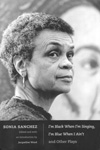September 17, 2010

Download image.
BIRMINGHAM, Ala. - Famed poet, activist and Birmingham native Sonia Sanchez is one of the nation's most prominent writers of the black arts and Black Power movements, best known for her militant prose of the 1960s and 1970s. But the half-dozen dramas she has written have received little attention - until now.
Jacqueline Wood, Ph.D., associate professor of English at the University of Alabama at Birmingham, has published the first-ever collection of Sanchez's dramas, I'm Black When I'm Singing, I'm Blue When I Ain't and Other Plays.
The book, published by Duke University Press and due out Oct. 15, 2010, includes The Bronx is Next (1968), Sister Son/ji (1969) and Sanchez's never-before-published dramas, I'm Black When I'm Singing, I'm Blue When I Ain't and 2X2. Like her poetry, the plays examine the racism and sexism she experienced as a young writer during the Black Power movement. The book also includes three essays in which Sanchez reflects on her art and her lifetime of social activism.
Wood says the idea for the book came after a frustrating attempt to find plays by Sanchez, who is retired from Temple University and living in Philadelphia, for her class in UAB's College of Arts and Sciences.
 |
| Jacqueline Wood. Download image. |
"I teach African-American drama, and I always like to include black militant playwrights to show the historical progression of African-American drama," says Wood. "I wanted to include a female, militant playwright and Sanchez was the most well-known of those. But I had difficulty finding her plays. I had to go to different journals, old journals from the 1970s, and I found one or two in old anthologies. I kept saying, 'Where is her collection?'"
There was no collection, Wood says. But if she needed it for her class, she thought other professors would, also. "I had always admired Sanchez's work, so I decided I was going to put a collection together.
Sanchez continues to lecture and give poetry readings around the world. But despite her international renown, "very few people know that she has written dramas or have even read them," Wood says. "Her drama has never been produced as it should be. Sister Son/ji was the most produced play and the only one that received New York critical reviews."
Wood calls Sanchez's plays "lyrical," and says the poet incorporated her primary craft and used choral devices to explore social justice. Her plays, Wood says, are entertaining and at times "they're shocking."
Wood writes in the collection, "Incorporating the responsibility of the poet into the venue of the dramatic, Sanchez has successfully accomplished what few militant writers have done well - transcending the genre divide."
Sanchez recently published her 18th book of poetry, Morning Haiku, with Broadside Press and is currently touring with a book-signing itinerary. She will attend an invited reading at the annual conference of the Association for the Study of African American Life and History in Raleigh N.C. at the end of September; Wood also will be there. Several of the book signings this fall and next spring also will include Wood's text, and Wood will be traveling with Sanchez to sign as well. Wood says she has planned for Sanchez to be in Birmingham for a signing of her new book of poetry and Wood's collection of her plays the first weekend in November.
For review copies of Wood's collection, contact Laura Sell, Duke University Press, 919-687-3639.
About the UAB Department of English
The UAB Department of English offers an undergraduate degree in English with concentrations in creative writing, linguistics or professional writing and public discourse, and graduate degrees in literature, rhetoric and composition, and creative writing. The Department of English is housed in the UAB College of Arts and Sciences, home to academic disciplines that include the arts, humanities, sciences and the School of Education. The college's unique structure advances research and learning in both K-12 and higher education, and its courses are taught by a world-class faculty.